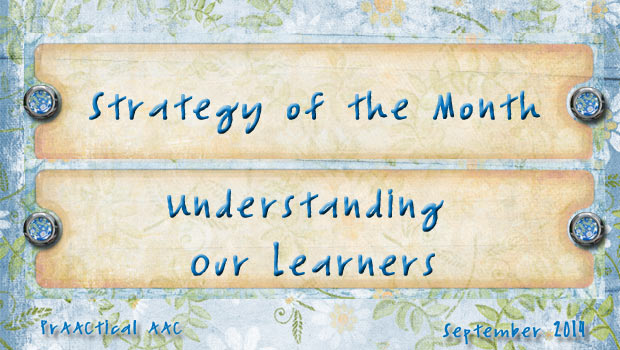Global Day of AAC: 2014

Join the party! Today, people all over the world are celebrating the possibilities of AAC. Judy Bailey has once again taken the lead to promote a variety of activities, Here’s what’s happening.
- A bit of conversation on the International AAC Awareness Month Facebook Page
- Discussions on Twitter that include a special hashtag: #AACchat
- An AAC chat via Skype (connect with Judy Bailey on Skype judy.bailey3) starting at 8 AM today Eastern Daylight Time (USA)
- Justin Bergers’ internet radio program at http://solaremire.ddns.net:8167/listen.pls
Filed under: PrAACtical Thinking
Tagged With: awareness
This post was written by Carole Zangari




4 Comments
hi there
not sure why this is happening… when I click on the radio show above and actually get the “Chipmunks” singing We are family! I’m still laughing! LOL
Nancy, Justin is a person who uses AAC and he is playing tunes for us to enjoy. Glad the Chipmunks gave you a smile. I got hard rock when I first tuned in. Trade ya!
I know this article is old but Justin is my friend and I wish I had known of this sooner I missed this by about three years. lol I may see if he will let me dj for him I am no aac user but I am blind I don’t understand what he is getting at sometimes when we are chatting on skype because he doesnt use full sentences is that normal to use an asl like writing style with aac users I don’t mean to seem mean I am just curious.
Jenni, thanks for your question. People who use AAC are a diverse group, but one thing that most of them share is that the act of communicating takes quite a bit of time and a lot of effort. It is hard to imagine what it must be like to have a thought and be driven to say something, and know that it will take several minutes just to say the first sentence or two. Very few people give them the time and space to express themselves when interaction moves so slowly, and this is incredibly frustrating for the person who uses AAC. Many of them compensate for the impatience of speaking people by truncating their messages or using more general responses that are pre-stored in the AAC device. Some also have difficulty creating sentences due to limitations in their language abilities. I can’t speak for Justin since we only met once, and I wouldn’t want to even if I knew him better, but I did want to share that general information in response to your comments. When I am communicating with someone who uses AAC and the message is ambiguous, I try to use the context to figure out the meaning and also give them explicit feedback that they can use to clarify their intent (e.g. “Heat tickets.” “Heat tickets? Not sure what you want to tell about Heat tickets. I need more information”). That allows us to work together to get to a point of muutual understanding. Hope that helps a little, Jenni.